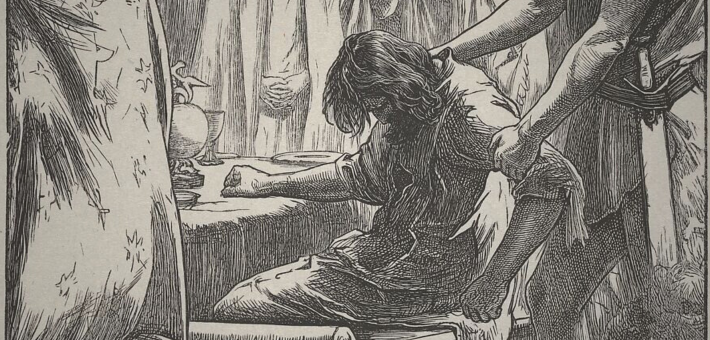Commentary on Exodus 32:1-14
Wait one minute! Readers of this text, stop throwing Aaron under the bus as the easy solution to the people’s problems of hubris and idolatry.
If we consider this scripture differently, Aaron’s life might offer us lessons from more than the failed leader. It might show us powerful “mirror moments” for our own souls. Let’s consider the text and Aaron’s part in it. He is surrounded by fearful people who make demands on him. Amid his distress, he does what many have done before; he bows to peer pressure. And because we have been taught to read this story as Aaron’s failure, we cease being curious about how his actions might be instructive to us and those who hear our sermons. Today, just for the next few minutes, let’s stop being so angry at Aaron. Let’s admit that we, too, have bowed to peer pressure. Let’s use this to examine not Moses, the great negotiator, but his older brother Aaron, because most of us will bow to peer pressure well before we successfully negotiate with God.
When the people of God realize Moses has been gone a long time, fear overtakes them, and they panic. Fear prevents our brains from functioning fully. Gripped by fear, it isn’t easy to regulate emotions. In the middle of a moment of panic, we do not read nonverbal actions accurately or process environmental clues well. And, when we are frightened or anxious, we react before considering the options available or the consequences that might follow. All of this leaves us susceptible to being ruled by emotions, impulses, and the desire to survive the source of the fear. This was Aaron’s predicament.
Now enter the people of God in Exodus 32:1. When we meet these fugitives from Egypt, they are scared and skittish. They confront Aaron, surround him, and demand a quick solution. The people suggest fashioning a “god” to go before them. Aaron, cornered and outnumbered, bows to peer pressure and hatches a plan to satisfy the people.
Next, the people, not Aaron, announce, “These are your gods, Israel, who brought you up out of Egypt.” Hearing the people’s blasphemous declaration, Aaron attempts a work of repair. He builds an altar and declares that on the upcoming day, there will be a festival to the Lord (Yahweh). But, the festival does not seemingly speak to the people’s hearts or settle the matter of Israel’s rightful God; instead, it turns into a time of feasting and revelry.
Now what, Aaron? Now what, reader of Working Preacher? What do we do when those around us pressure us and we find ourselves in a situation similar to Aaron’s; on the wrong side of right, absent the presence of mind to adhere to an ethical standard, and wordless in the face of wickedness?
Given our contemporary culture, this is no rhetorical question. We are living in a time when peer pressure gathers around us, surrounding us with “facts” that have no basis in truth, shouts meant to drown out reasonable discourse, revisionist history that calls chattel slavery good for the enslaved, and division that seems to tear at the soul of our nation. Peer pressure would have you take a side and stand there, even when you recognize that the side on which you stand is based on falsities of all kinds. Peer pressure would have you deny the humanity of those who do not make the choices you make. It invites you to draw a line in the sand and stay on your side at all costs, and I mean all costs. We live in a time when peer pressure calls out to her partisan folk and demands that whoever is on the other side be demonized, dehumanized, and destroyed. Working Preacher reader, the closer we come to our national presidential elections, the more critical Aaron’s lessons about the power of and the prophylactic against peer pressure become.
Before continuing, let’s admit that peer pressure is real and not limited to the teen years. Pressure to conform your actions, reactions, and interactions to someone else’s standard is present in the workplace, the church, and the bytes of social media that inhabit our days and devices. This pressure warps relationships and undermines cohesiveness. It creates anxiety and competition and causes depression. And it divides us into camps of people who no longer attempt to cross bridges of compromise. Peer pressure twists us out of shape, just like it contorted Aaron.
However, despite the ubiquity of peer pressure, Aaron did have choices, and so do we. How do we make wise choices when it comes to peer pressure? How do we withstand this force and still stand firmly in the place of one who follows Christ? What if we began by asking ourselves what other options were available to Aaron and what might those options teach us when we are surrounded and hounded by the pressure of our peers? Using the chapters of Exodus as our source, Aaron might have:
Rehearsed God’s word
As early as Exodus chapters 6 and 7, God speaks to Moses and Aaron and promises them the land and a safe journey to it. This word was known to Aaron. In the face of peer pressure, our brother had a solid place to stand if he had chosen to do so, assuming a position based in God and not in fear.
Reviewed God’s miracles
Whether one considers delivery from the plagues (chapters 7–10), the crossing of the Sea (chapter 15), the manna and quail (chapter 16), or water from rocks (chapter17), the book that holds today’s pericope is full of the miracles of God. Aaron was present at each of these miracles. He saw it all. The same God who held sway then held sway in chapter 32, if only Aaron had remembered God’s faithfulness to a stubborn people.
Remembered God’s promises
Exodus 19:5-6 reminds God’s people that their future is assured if they obey God’s voice. This promise is throughout the biblical story. If Aaron’s heart had been secure in this promise, the people’s approach might have been rebuffed, and the whole golden calf thing avoided.
Those who take up residence in your pews this weekend may be laboring under the forces of peer pressure and seeking ways to withstand it. Aaron’s story is a cautionary tale worth telling. If your people are facing peer pressure, offer them the opportunity to steady themselves before responding by rehearsing God’s word and its application in their lives. When others gather around them and demand action contrary to the nature of Christ at work within them, call them to ask what would shift if they remembered not only the miracles in the biblical word but the ones that have kept them from hurt, harm, and danger. And assure them that there is a powerful force opposing this pressure; it is the force of the divine promises God offers.
Aaron and the golden calf story may be one of the best heuristic moments in the text. If we stop being angry at Aaron and take his story in, we can use it to imagine new options for Aaron and, in so doing, for ourselves. May we go and do likewise.



October 15, 2023